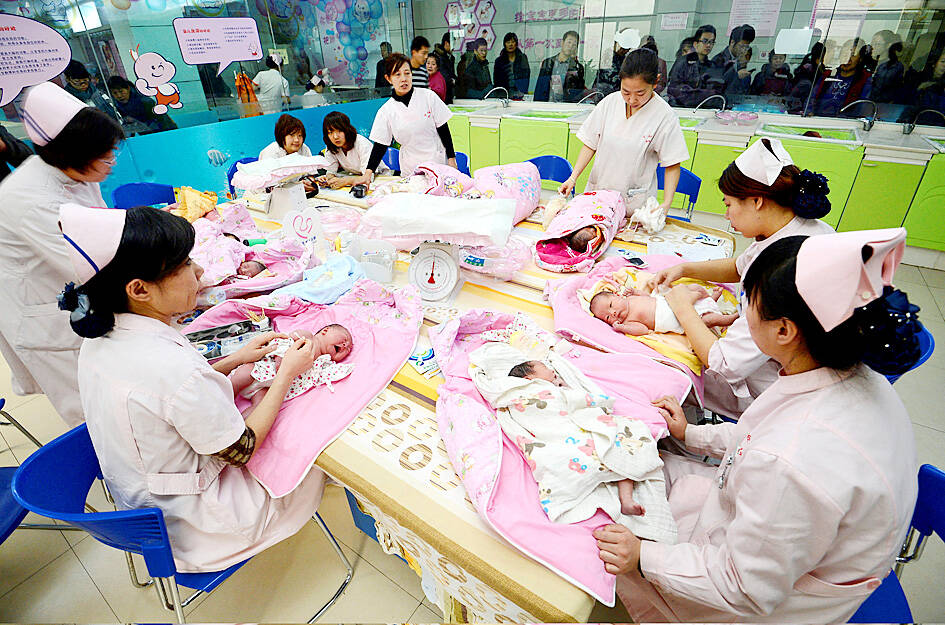China said that by the end of this year all tertiary level hospitals must offer epidural anesthesia during childbirth, a move it said would help promote a “friendly childbearing environment.”
Tertiary hospitals — those with more than 500 beds — must provide epidural anesthesia services by this year, while secondary hospitals — those containing more than 100 beds — must provide the services by 2027, the Chinese National Health Commission said in a statement last week.
Authorities are struggling to boost the birthrate in the world’s second-largest economy after China’s population fell for a third consecutive year last year, with experts warning the downturn would worsen in the coming years.

Photo: Reuters
About 30 percent of pregnant women in China receive anesthesia to relieve pain during childbirth, compared with more than 70 percent in some developed nations, the China Daily reported.
The WHO recommends an epidural for healthy pregnant women requesting pain relief and it is widely utilized in many nations, including France, where about 82 percent of pregnant women opt to have one, and in the US and Canada, where more than 67 percent do.
The move would “improve the comfort level and security of medical services,” and “further enhance people’s sense of happiness and promote a friendly childbearing environment,” the commission said.
A growing number of provinces across China are also beginning to include childbirth anesthesia costs as part of their medical insurance schemes to encourage more women to have children.
High childcare costs, as well as job uncertainty and a slowing economy, have discouraged many young Chinese from getting married and starting a family.
Health authorities in Sichuan Province have proposed extending marriage leave up to 25 days and maternity leave up to 150 days to help create a “fertility-friendly society.”

The military is to begin conscripting civilians next year, Cambodian Prime Minister Hun Manet said yesterday, citing rising tensions with Thailand as the reason for activating a long-dormant mandatory enlistment law. The Cambodian parliament in 2006 approved a law that would require all Cambodians aged 18 to 30 to serve in the military for 18 months, although it has never been enforced. Relations with Thailand have been tense since May, when a long-standing territorial dispute boiled over into cross-border clashes, killing one Cambodian soldier. “This episode of confrontation is a lesson for us and is an opportunity for us to review, assess and

The United States Federal Communications Commission said on Wednesday it plans to adopt rules to bar companies from connecting undersea submarine communication cables to the US that include Chinese technology or equipment. “We have seen submarine cable infrastructure threatened in recent years by foreign adversaries, like China,” FCC Chair Brendan Carr said in a statement. “We are therefore taking action here to guard our submarine cables against foreign adversary ownership, and access as well as cyber and physical threats.” The United States has for years expressed concerns about China’s role in handling network traffic and the potential for espionage. The U.S. has

IDENTITY: A sex extortion scandal involving Thai monks has deeply shaken public trust in the clergy, with 11 monks implicated in financial misconduct Reverence for the saffron-robed Buddhist monkhood is deeply woven into Thai society, but a sex extortion scandal has besmirched the clergy and left the devout questioning their faith. Thai police this week arrested a woman accused of bedding at least 11 monks in breach of their vows of celibacy, before blackmailing them with thousands of secretly taken photos of their trysts. The monks are said to have paid nearly US$12 million, funneled out of their monasteries, funded by donations from laypeople hoping to increase their merit and prospects for reincarnation. The scandal provoked outrage over hypocrisy in the monkhood, concern that their status

The US Department of Education on Tuesday said it opened a foreign funding investigation into the University of Michigan (UM) while alleging it found “inaccurate and incomplete disclosures” in a review of the university’s foreign reports, after two Chinese scientists linked to the school were separately charged with smuggling biological materials into the US. As part of the investigation, the department asked the university to share, within 30 days, tax records related to foreign funding, a list of foreign gifts, grants and contracts with any foreign source, and other documents, the department said in a statement and in a letter to